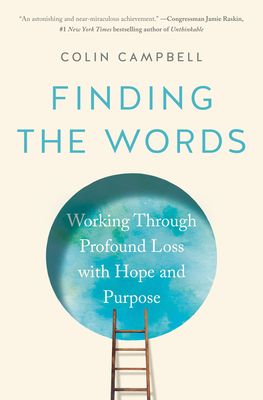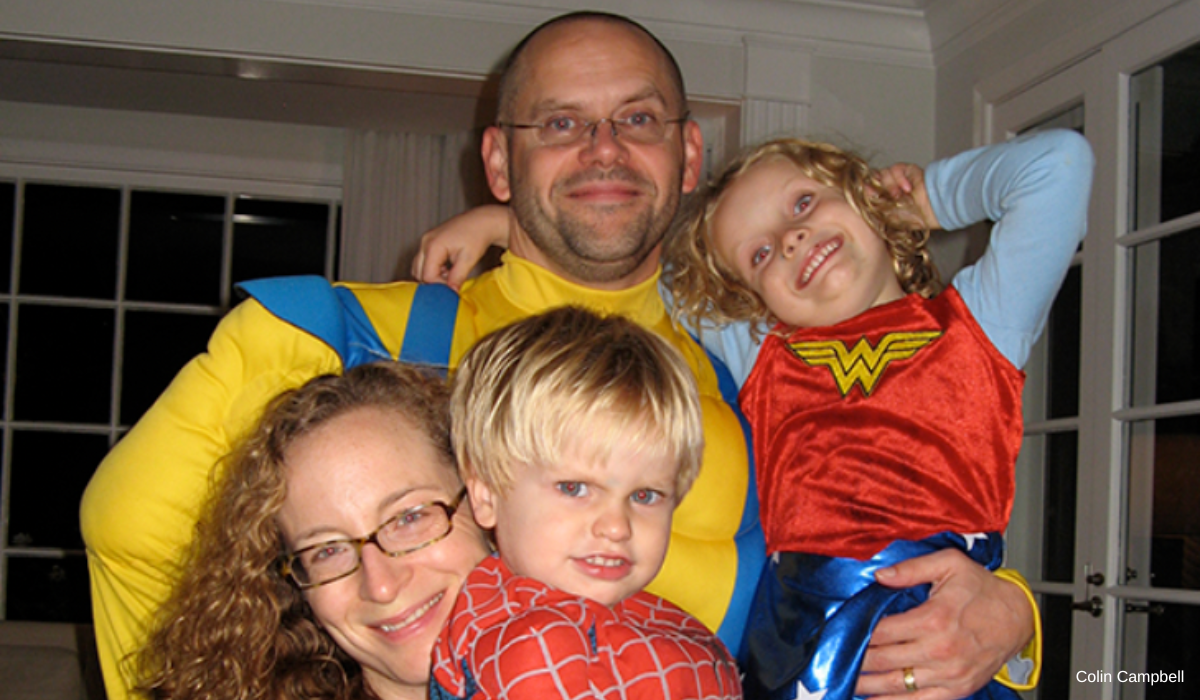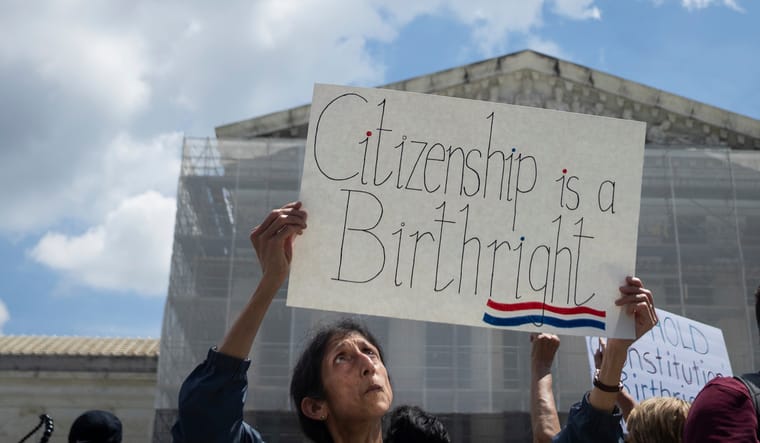Colin Campbell Faced the Unthinkable: Losing His 2 Kids. His Radical Approach to Grief Helped Him find Solace—and It May Help You, Too
It was an unconscionably horrific moment. Colin Campbell and his wife, Gail, were sitting in the hospital. They’d just been in a car accident, T-boned by a drunk driver. Their two children, Ruby and Hart, were in the backseat when it happened. Ruby and Hart died.
“It was so inconceivable,” Campbell says of the moments in the hospital. “We were in denial. We were insane, it felt like. It didn’t feel real.”
As Campbell and his wife were reeling, a doctor brought them to a room. What she then did ended up being a pillar in the couple’s grief journey. “She said, ‘tell me about Ruby and Hart,’” recalls Campbell. “It was an action we could perform rather than just being impotent. It allowed us to talk.”
It all might seem strange or too much. Ruby and Hart had just passed. But Campbell says that invitation to simply share about his teenage kids was “a beautiful lesson” about the necessity of finding the words, even in acute moments of anguish.
In the weeks and months after the accident, Campbell read many grief books, but the counsel did not help. He says the advice presented grief as a “mysterious and private process” that he had to figure out on his own. But Campbell needed help. Like in the hospital, he needed to talk about his pain, his children, and his needs with others. He wanted to find ways to actively work through the unconscionable.
So he did, and he continues to. The days, months, and years after Ruby and Hart’s deaths were a “brutal lesson in unwanted wisdom” about journeying through grief. Campbell shares what he learned in his beautiful book, Finding the Words: Working through Profound Loss with Hope and Wisdom. Deeply heartfelt and frank, Finding the Words offers “a radical approach to grief,” as Campbell writes. It offers guidelines, rituals, and approaches that helped him and his wife "lean into" their pain, which he hopes will help others.
Because as he tells us, no one ever wants to grieve. That is because no one ever wants to lose the people they love. But by talking and by finding the words, it may offer the light needed to navigate this heartbreaking truth—and to honor the love that endures.
A CONVERSATION WITH COLIN CAMPBELL
You've been open about how much of the conventional grief advice hasn't helped you. What were you seeking?
Almost everybody and every book was saying that everybody grieves in their way. I understood why they were saying that. The books and the therapists were trying to say there’s no right or wrong way to grieve. It was all about validation. I understand that, and that's very positive. But it wasn't helpful for me because, at that moment, I didn't need my grief to be validated. I needed help. And saying that everybody grieves in their own way meant I had to figure it all out. What I wanted were some guidelines, some sort of signposts to help me along rather than just give me permission to grieve.
From your experience, what do you believe people need in grief that is commonly overlooked?
Here’s my central belief: When we experience anything in our lives, we talk about it with other people. That's how we process it. This can be anything good or bad. When we see a great movie, we want to talk about it. When we read something terrible in the paper, we want to talk about it. When we get married, we want to bring people to witness it. That’s how I think we process anything as human beings: We talk about it. We put it into words. But grief is something that everyone says, ‘whoa, that's too much. We can't talk about that. There are no words to process that grief.’ I believe that's not true. I believe that the actual process of grieving is us putting into words our feelings, and also our experiences of love for the people we lost.
To me, active grieving is talking about our loved ones and about our journey through grief to allow us to process it. When somebody dies, especially if they die suddenly and unexpectedly, there’s so much denial. I say in my book, I believe everybody avoids grief in their own way. I avoid grief too. It's not a bad thing or a judgment. But I believe we need to be articulating it in some way and sharing about it, through art, communal activities, and rituals so that we can understand it.
This speaks to the title of your book, Finding the Words. Tell me about what’s behind this title.
As we’re on our journey through grief, we need to find the words to express what we're going through, to express the love we still have for the people we lost, and perhaps most helpfully express our own needs to our community.
I learned some profound lessons through the Jewish practices of mourning. I'm an atheist and I grew up in a non-religious household. I enjoyed that, but it left me with no cultural tools to grieve. My wife is Jewish, which is how we raised Ruby and Hart. We were active members of our temple. I embraced the rituals and practices of Judaism, so we leaned on the Jewish rituals of grieving, so many of which are about community. For example, instead of just having one gathering after the funeral, we had seven nights of Shiva. This is one opportunity to gather, talk about the person lost, talk about your own experiences, and for others to reflect and talk. We had people sharing stories about Ruby and Hart, and it was so beautiful and meaningful. We all cried together.
At first, I didn't want people to come to my house. I was in this profound grief and I’d been weeping all day long and struggling. But then when they came, I got it. I thought I need this, I need to talk, I need to share.
You write about the importance of telling people what you need when you’re grieving. You call it the ‘grief spiel.’ Talk about this.
Once Shiva had ended, we were on our own. But when friends came by, they would be stricken. They look terrified. It was all too scary because what if they said something wrong or inappropriate? So they were terrified, but I knew I needed to have conversations. I wanted to talk about Ruby and Hart. I wanted to hear their names, but these people coming over were not prepared to say Ruby and Hart's names. So Gail and I would pull each of them aside and tell them our grief spiel, which was what we needed. We told them that we needed to talk about Ruby and Hart. We needed to hear their names. We needed to talk about our grief. And that we couldn’t really talk about anything else for more than two or three minutes. “That’s where we're at,” we’d say.
That changed over time. I became less needy. Now I can talk about other people's grief and pain. But in that early acute grief, I had no room for anybody else. Telling that to my friends, all of whom wanted to help me, was so helpful to them. They were so grateful. They said giving them some ground rules was valuable. It allowed us to have meaningful conversations about grief and loss.
Journaling was a practice that helped you. How so?
I’d never journaled before. But again, this goes back to finding the words. We are inarticulate in our grief. We struggle to say anything and yet it's so helpful to be able to articulate what's going on. For me, journaling was a way to start to find words to express what I was feeling. It wasn’t always articulate. It wasn’t good writing. A lot of it is me swearing or repeating over and over how angry I am. But it allowed me to process rather than be stuck and isolated in my head.
You offer a great analogy about going to the dentist…
Yes, nobody wants to go to the dentist, but the longer you wait, the worse it's going to be. Nobody wants to grieve. Everybody wants to do it later. A lot of the time, the grief books and therapists say to grieve in your own time. That also wasn't helpful to me because I needed someone to help encourage me to grieve, because I didn’t want to.
Part of my message in my book is trying to encourage people to lean into the pain of it all. When you lose somebody you love, you're going to feel pain. That's it. There's no way to avoid the pain of loss. You love them so much and it hurts to lose them. But if you avoid that pain, it doesn't go away. It festers and you can feel stuck in it.
Two more pieces of wisdom that helped you included saying yes to things and getting out of bed. How were these helpful?
I had this strong urge to stay in bed, just lie there. It was just too scary to even just get out of bed or leave our house. I was scared that if I went out into the world, it would hurt more somehow. But I knew that just sitting in stewing wasn't going to be healthy. Again, many people say to grieve in your own time, and if you need to take a day lying in bed, just do it. But I knew I needed to get out of bed and do something with somebody else. So I decided to say yes to any invitation that came my way. If someone asked, ‘Hey, wanna go for a walk?’ my first thought was, no. Every time: no. But then I realized that was always out of fear. So I said yes to everything no matter who offered it. That was just helpful because it was hard to make decisions in early grief—about anything. So to be able to just say yes to everything meant that I had my calendar full. I would see maybe two different people and do two different things a day. That was all helpful because it allowed me to be in life with my grief. And it allowed me to invest in the idea of life.
In your book, you include a list Ruby wrote that includes things she wanted to do in life. For the reader, it's an honor to learn more about her…
Ruby was this badass lesbian warrior who also loved to sew. She had listed things like crochet and painting and then sword fighting, flying a plane, and lock picking. Those juxtapositions captured her beautiful duality.
And will you tell us something about Hart?
Hart was the class clown, but the class clown with a heart. He was incredibly sweet and kind, and he was known for it. If you're feeling down, go to Hart, he'll cheer you up. Everybody wanted to be around him. He was the life of the party.
They were both beautiful children.

Colin Campbell is a writer and director for theater and film. He was nominated for an Academy Award for Seraglio, a short film he wrote and directed with his wife, Gail Lerner. He has taught Theater and/or Filmmaking at Chapman University, Loyola Marymount University, Cal Poly Pomona University, and to incarcerated youth through The Unusual Suspects. His one person show titled, Grief: A One Man ShitShow, premiered at the Hollywood Fringe Festival where it won a Best of Broadwater Award. You can learn more at colincampbellauthor.com and order his book, Finding the Words, here.
Please note that we may receive affiliate commissions from the sales of linked products.



